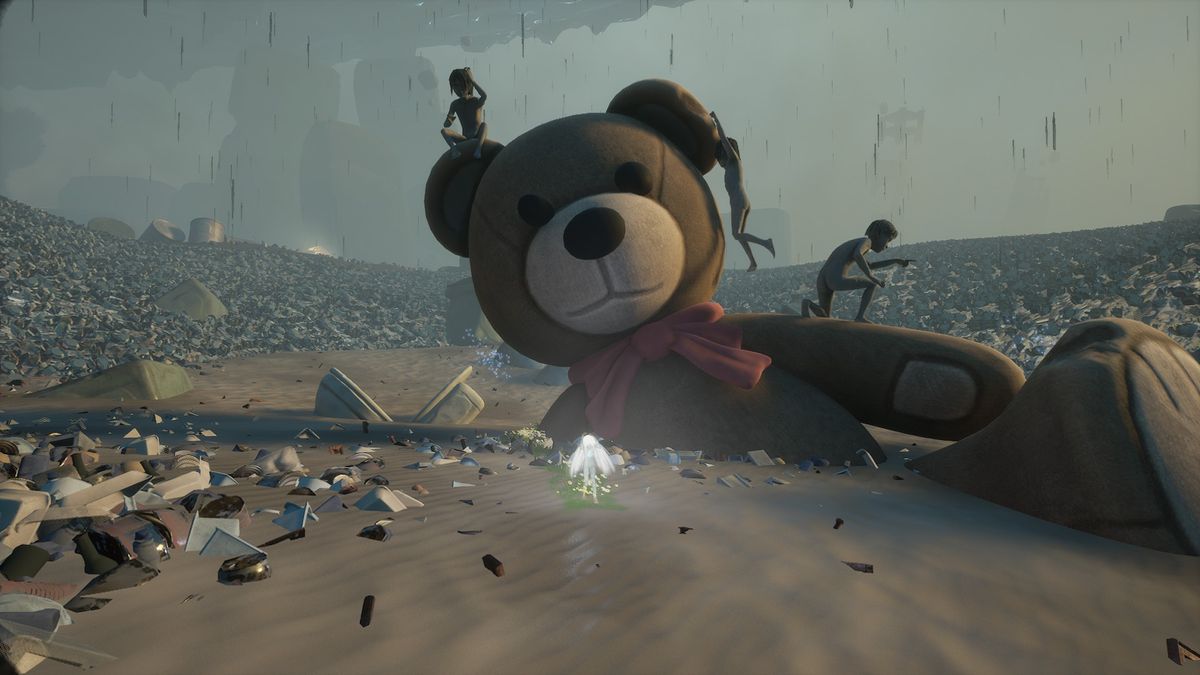12DOVE Verdict
After Us combines stunning vistas of environmental decay with a dreamlike flow to its light platforming challenges. Despite some missteps, such as ill-fitting combat, exploring and affecting its world is a gratifying process that comes with a wave of emotional ups and downs.
Pros
- +
Stunning environments that excel in visual storytelling
- +
A wide variety of light platforming challenges
- +
Rescuing animal spirits is highly rewarding
Cons
- -
Combat sections feel out of place
- -
Sometimes heavy-handed with its themes
Why you can trust 12DOVE
One of the most glorious sights in After Us, the eco-conscious platform adventure from developer Piccolo Studio, is honey. Partway through, you find yourself inside an enormous beehive, walls dripping with caramel gold. It looks good enough to eat alright, although actually it's good enough to climb – a sticky means for your spritely character to reach the upper echelons of the hive. As you rise, however, the delicious scenario turns sour. Caked within the nectar are the corpses of the bees. Soon, insect husks pile up in the hallways of the structure, until the scene resembles the aftermath of a massacre.
So it goes in After Us – a hazy concoction of beauty and ugliness. Piccolo's ambitious follow up to its accomplished indie debut, Arise: A Simple Story, thrusts you into a warped post-human world, where everyone and everything is dead, and wondrous remnants, such as that honey, linger like reminders of lost treasure. Then again, maybe it's not lost forever. As a magical Spirit of Life, you set off to track down and release eight animal essences to revitalize the energy of Gaia.
In practice, your quest involves a lot of running and jumping to explore a range of interconnected semi-open areas, each of which catalogs humanity's abuse of nature. In one sequence you navigate production lines of rusted cars within an automated factory. In another you dodge chomping diggers in a landfill site, sheltering inside discarded washing machines from toxic rain. Later, you swim through oceans clogged with split oil ships and snaring trawler nets.
Muck and Magic
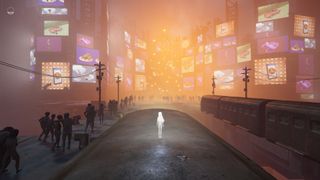
It's ugly. It's beautiful. Piccolo established with Arise that it has a knack for striking views, and that goes double here, as menacing structures float and twist impossibly, framed by a zoomed-out camera to accentuate their tragedy. For your diminutive savior, everything is gigantic, looming in great detail as you scale suspended blocks of masonry, hop across swinging cranes, or take cover from the breath of an ocean liner's spinning engine propeller. Spaces are also stacked with dizzying verticality – lumps of train tracks suspended in the sky, say – challenging you to find a way up.
At times, the imagery is reminiscent of that in Little Nightmares. Scenes are peppered with naked petrified people, grotesque yet pitiful. Some are frozen around points of interest, others point at the horizon (hinting where you might go next). All seem to have been on some migratory journey, presumably hoping the grass was less dead on the other side. Around them, a poisonous bubbling mud infested with tendrils, uncanny like hair viewed under a microscope, which yank you into the bog if you draw too close. Yet you wouldn't call After Us a horror game – its freakishness isn't about the terror of fleeing from monsters, but the melancholy of a battle already lost.
One antidote to the gloom is your avatar – the endlessly innocent, fearful yet determined girl with impossibly long white hair, clad in a skin suit made of silver scales. Flowers bloom in her wake as she glides around the detritus in smooth parabolas. A charged burst of life energy coats the immediate surroundings in lush vegetation for a few moments. Her movement, as a platform game character, is floaty and dreamy. She skates then springs then drifts like a dandelion seed, allowing you to calmly test the scenery to see what's in reach and where you need to go.
Gotta save 'em all
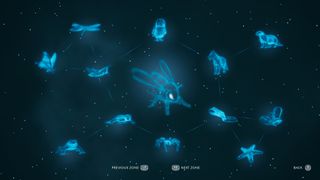
The biggest stars of the show, however, are the animals you can rescue. As much as discovering those dead bees delivers a gut punch, releasing the spirits of extinct species produces genuine joy. Alongside the eight main targets, a hundred other hidden beasts can be rooted out and set free to roam the landscape again, albeit in ghostly form. You don't have to do so, but since you often have to explore anyway to figure out the critical path, you may as well take a little more time to gather as many creatures as you can.
Indeed, given that After Us isn't an especially challenging game to pick your way through, locating the obscured paths that lead to animals is often where it becomes most satisfying. And while there's no tangible gain for releasing spirits, other than advancing a completion percentage, it's rewarding in its own right (it says something that I tracked down the whole menagerie before finishing the game). Even early on, when you liberate cats, raccoons, and pigeons, the land already feels more alive. Later, you get to big ticket beasts – lions, elephants, eagles, dolphins – and seeing them filling each frame, flying, swimming, roaming, grooming, creates a sense that you're making real change.
In its exploration and spirit rescuing, After Us nails its conservational themes too. The way the game refuses to show you the main path forward prompts you to look around properly, to understand the lay of the land. In other words, you can't merely treat the environment as an obstacle or a means to an end, which is surely the core point. Meanwhile, the relatively slow, open pace of your adventure enables you to absorb the sights and sounds, appreciate how the world got into this state, and marvel at what could still be as you bring the spirits back.
Heart breaker
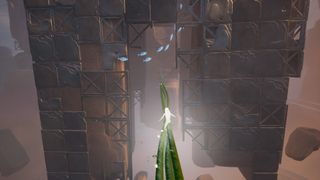
It's not all a bed of roses, though. In contrast to these defter thematic touches, After Us also has a tendency to be a little heavy-footed in its tour of human sins. Being pelted with homing missiles in the form of plastic carrier bags simply seems a trifle absurd, for instance, while shutting down drilling oil towers to create an oasis of green that acts as a warp point is something of a brute metaphor. Obstacles such as giant buzzsaw blades in the forest area are equally a little in your face for a game that elsewhere shows a flair for artistic articulation.
An even louder mechanical clanger is dropped when After Us decides to elbow combat into its mix, as humans known as 'devourers' come to life and try to grab you, and you fight back by throwing your 'heart' at them in order to 'redeem' them. In the event, this boils down to some basic and soggy third-person shooting, and regardless of the language used to dress it up as something else, hammering away at a fire button feels at odds with the theme of creating a less violent future for the world.
You may also balk at the length of some sections, especially the first, which milk their themes like an intensively farmed dairy cow before introducing the next. And, as in Arise, the distant camera view for this sort of game does come at the cost of some precision in controlling and judging jumps. No doubt, Piccolo has made moves in the right direction here, providing a double jump and air dash to help you compensate for wayward leaps, along with generous checkpointing, but it's still not ideal.
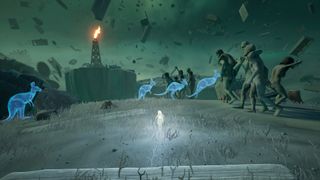
Yet in hindsight, it's not the clumsier elements that stick in the memory, but the wide variety of spectacular, sad, and uplifting moments. Like the best classic platform games, every area in After Us feels unique in its demands, tossing new light platforming puzzles into the mix, from determined climbs to skating between electricity pylons, to being hunted under spotlights and rifle fire.
All the while, your burst of life and heart throw powers are repeatedly repurposed into methods of hitting switches to stop and start machinery, say, or shift mine carts along tracks to create makeshift steps. Against all the horrors of humanity, then, the real beauty here is understanding that something very different may come next.
After Us was reviewed on PC, with a code provided by the publisher.
More info
| Genre | Platformer |
Jon Bailes is a freelance games critic, author and social theorist. After completing a PhD in European Studies, he first wrote about games in his book Ideology and the Virtual City, and has since gone on to write features, reviews, and analysis for Edge, Washington Post, Wired, The Guardian, and many other publications. His gaming tastes were forged by old arcade games such as R-Type and classic JRPGs like Phantasy Star. These days he’s especially interested in games that tell stories in interesting ways, from Dark Souls to Celeste, or anything that offers something a little different.

This $50 gaming mouse is one of the most comfortable I've tested so far, and it's at a record-low price
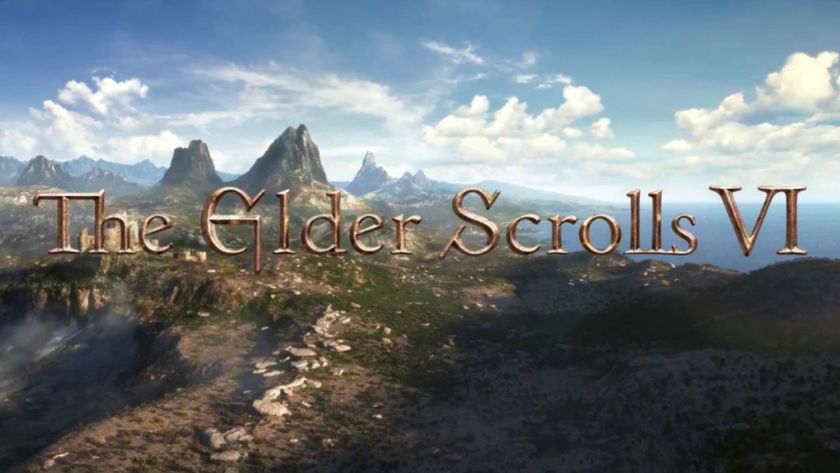
The Elder Scrolls 6 sleuths use Starfield math to narrow down the Skyrim sequel's potential release window, and sorry folks, it's still looking like it's ages away
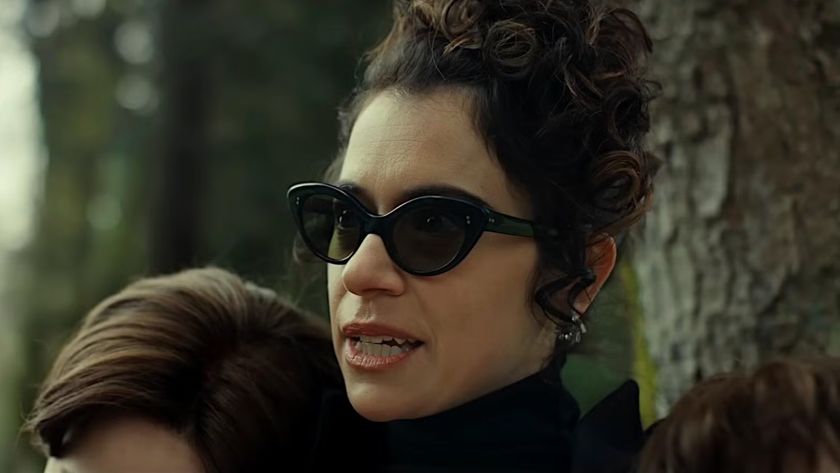
She-Hulk star Tatiana Maslany says her next horror movie with Osgood Perkins won't be anything like The Monkey or Longlegs: "There's always a little mischief"
Most Popular




